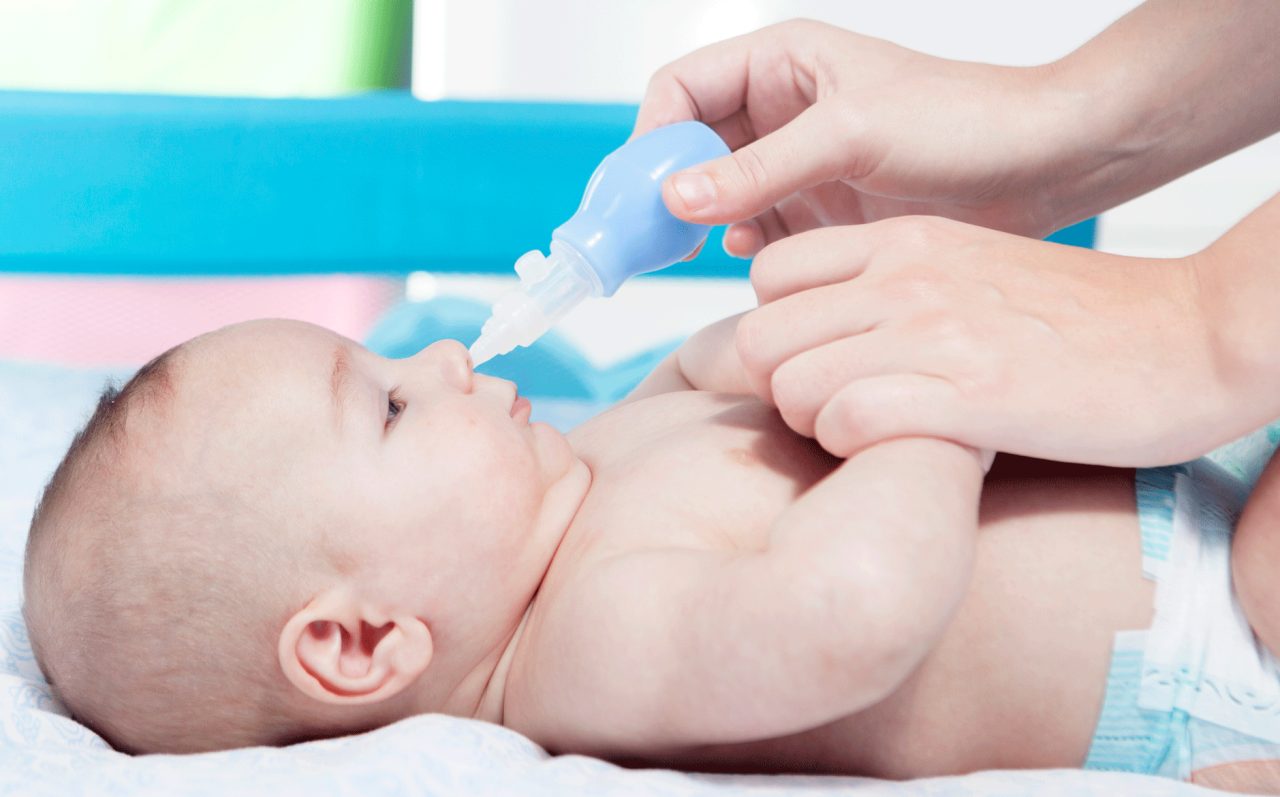How to Treat Congestion in Your Baby

Cold medicines aren’t a good idea for babies; they can be dangerous. But you have other choices. Here's how to help your baby get rid of congestion.
Infants haven’t had time to build up antibodies that fight off common sicknesses like the common cold or the flu. In addition, their sinuses are especially sensitive to irritants. That means they are more likely to get a stopped-up nose.
It’s hard to watch your baby struggle to breathe. Infants are too little to blow their noses, and cold medicines are dangerous for them.
What can you do to help your baby breathe easier? Here’s a guide to congestion remedies for the littlest noses.
YOU MIGHT ALSO LIKE: Why Mucus Is Good
Use saline and suction
One safe way to clear your baby’s clogged nose is with saltwater (saline). Make a saline solution by mixing ¼ teaspoon salt with 1 cup of lukewarm water, or buy premade infant saline drops at a drug store.
Every few hours, spray two drops of saline into each of your baby’s nostrils, then use a bulb syringe to gently suction out the mucus.
To do that, squeeze the bulb of the syringe first. Then place just the tip into your baby’s nose and release the bulb to draw out the mucus.
After each use, wash the tip of the syringe with warm water and soap to avoid re-infecting your baby.
Turn on a vaporizer
Before naps or bedtime, turn on a cool-mist vaporizer in the nursery to prevent you baby’s nasal passages from getting too dry.
“Humidifiers add moisture to the air to make breathing easier,” says Andrew Hotaling, MD, FACS, FAAP, a pediatric otolaryngologist at Loyola University Medical Center. “Make sure you properly clean the humidifier regularly so you are not blowing mold or mildew into the air, which can further cause illness.”
Give extra fluids
“The baby is losing moisture from the congestion. Make sure you are giving lots of appropriate liquids,” Hotaling says.
Extra fluids will thin mucus, making it easier to remove. Water, fruit juice, and infant electrolyte solutions are the best options. Offer those drinks in between regular breast milk or formula feedings.
Elevate your baby’s crib
To give your baby a better angle through which to breathe, elevate the head of the crib mattress slightly. Put a pillow, folded towel, or wedge under the mattress to raise it.
Never put extra items inside the crib; your baby could roll over and choke on them.
Cold treatments to avoid
Never give an over-the-counter cold medicine to children under age six — even if it’s labeled “Children’s.” Such drugs haven’t been shown to help young children, and they can have potentially serious side effects in this age group. Some doctors still recommend them, but be aware that the American Academy of Pediatrics disagrees.
Also avoid using medicated vapor rubs on babies. Although those products are considered safe for children over age two, the ingredients might irritate children’s airways, leading to even more mucus production and breathing difficulties.
“Infants and young children have airways that are much narrower than those of adults, so any increase in mucus or inflammation can narrow them more severely,” said Bruce K. Rubin, MD, FCCP, a pediatrician at Children’s Hospital of Richmond, Va.
Vicks offers a nonmedicated BabyRub scented with lavender and rosemary. Medicated vapor rubs are different: They contain camphor, eucalyptus, and menthol.
Symptoms of respiratory distress
- Pale or bluish skin.
- Increased breathing rate.
- Retractions — Your baby’s chest pulls in with each breath.
- Nostril flaring — Your baby’s nostrils widen when breathing in.
- Grunting or wheezing.
- Clammy skin.
- Mood change — Your baby is sleepier than usual, difficult to wake, or fussier than normal.
When to see your baby’s doctor
Even in the youngest patients, most colds will clear up on their own within a few days. If your child is still congested after two weeks, is running a fever, or shows signs of dehydration (fewer wet diapers or no tears), call your pediatrician.
“Also see the doctor if the baby refuses to eat or drink or experiences difficulty with swallowing,” Hotaling said.
Updated:
December 04, 2023
Reviewed By:
Janet O’Dell, RN